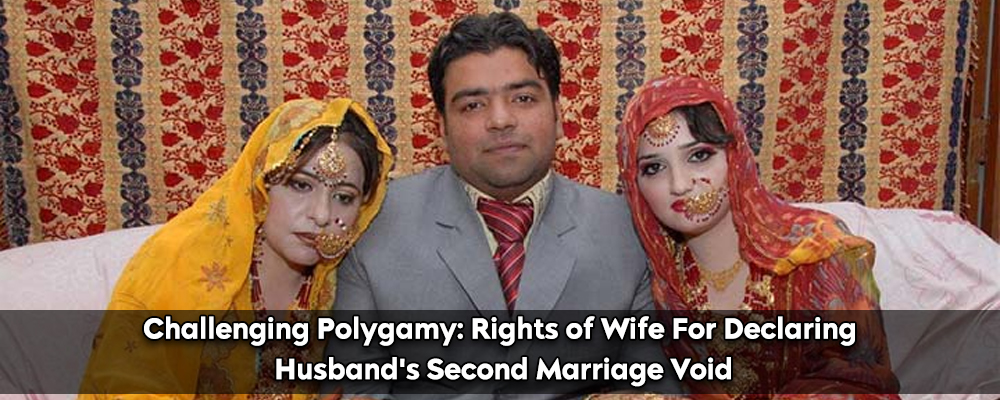One of the basic foundations of society is the institution of marriage, and numerous legal frameworks work to preserve its sanctity. The Hindu Marriage Act of 1955 in India regulates Hindu weddings and offers standards for separation, alimony, and other relevant issues.
The Act’s attitude on monogamy, which forbids someone from being married to more than one person at once, is one of its most important features. The Act gives the first wife the authority to contest the validity of her husband’s second marriage and request that it be declared null and void in accordance with Section 11 to defend her rights.
Need A Legal Advice
The internet is not a lawyer and neither are you. Talk to a real lawyer about your legal issue

Section 11: Hindu Marriage Act
Bigamy, the practice of being married to someone else while the prior marriage is still active, is addressed under Section 11 of the Hindu Marriage Act. The provision categorically states that any second marriage contracted by a person who already has a spouse is void. The purpose of this clause is to uphold the exclusive nature of the marriage and safeguard the first wife’s rights.
Ground for Challenging Polygamy
The first wife must provide specific evidence in accordance with Section 11 of the Act in order to effectively contest her husband’s second marriage. The grounds are as follows-
Existence of First Marriage
The first wife must demonstrate that her union with her husband is still legally binding and isn’t been dissolved or terminated. The husband’s second marriage might not be regarded as void under the Act if the first marriage is ceased to be legal.
Credibility of Second Marriage
The first wife must provide proof that the second marriage actually occurred and is accepted by the applicable laws. She must offer enough proof to back up her assertion.
Lack of Consent
If the first wife gave her consent for the second marriage is one of the crucial factors. The second marriage can be deemed invalid if she did not expressly consent to it.
Concealing of Existing Marriage
If the husband has concealed his first marriage from the second spouse; there is a good reason to declare the second marriage null and void. Non-disclosure could be viewed as dishonest and false.
Prior Judiciary Declaration
If the first marriage has already been ruled by a judge to be void; the second marriage may be regarded as legitimate. The first wife, however, must demonstrate that when she submitted the application, she was not aware of this declaration.
Case of Adultery
In some situations; the first wife may have grounds to contest the validity of the second marriage if the husband committed it as a result of adultery or infidelity.
Challenging Polygamy: Legal Procedure
- The first wife must submit an application to the relevant family court under the virtue of Section 11 of the Hindu Marriage Act in order to contest her husband’s second marriage.
- It is essential to offer all pertinent proof and paperwork to back up her allegation.
- The validity of the second marriage will subsequently be decided by the court after it has reviewed the case and taken into account the facts.
Role of Judiciary: Allahabad High Court
In the case of Garima Singh v Pratima Singh and Another, the Allahabad High Court ruled that the husband’s second marriage was declared null and void since it was entered into while the first marriage was still active. The second marriage’s legal standing was unaffected by the fact that the husband had acquired a divorce judgment from the first wife after the second marriage.
The court highlighted that regardless of any eventual divorce achieved, it is categorically illegal for a person to be married to more than one person at the same time.
Challenging Polygamy: Consequences
- If the husband’s second marriage is ruled invalid by the court, it will have no effect or legal standing.
- No legal rights as a wife are granted to the second spouse, and whatever claims she might have regarding maintenance or property rights are waived.
- The first wife continues to hold her position as the legal wife and is still entitled to all of the marriage’s benefits.
Protection of the Rights of First Wife
- An essential safeguard for women’s rights is the clause in the Hindu Marriage Act that enables the first wife to contest her husband’s second marriage and request that it be declared null and void.
- For the first wife, polygamy can result in severe challenges such as emotional anguish, monetary uncertainty, and social humiliation.
The Hindu Marriage Act guarantees that women have the resources to defend their rights and uphold the authenticity of their marriages by offering a strong legal remedy. The act of contesting a second marriage may be extremely draining for the first wife, but it is an essential step in creating a culture that respects monogamous relationships and all parties to a marriage’s rights.
One can talk to lawyer from Lead India for any kind of legal advice. In India, free legal advice online is accessible at Lead India. Along with having free legal advice online, you can even ask questions to experts online free from Lead India.





 Talk to a Lawyer
Talk to a Lawyer